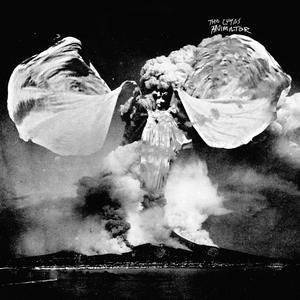
The Luyas
Animator
Release Date: Oct 16, 2012
Genre(s): Pop/Rock, Alternative/Indie Rock, Alternative Pop/Rock
Record label: Dead Oceans Records
Music Critic Score
How the Music Critic Score works
Buy Animator from Amazon
Album Review: Animator by The Luyas
Very Good, Based on 9 Critics
Based on rating 84%%
There’s something about the frigidly beautiful landscapes of Canada that consistently deliver excellent, textured indie art pop, from Braids to Grimes to Purity Ring. With their latest, Animator, The Luyas embark on a sonorous, reflective work, with songs ranging from the quiet brilliance of opener “Montuno” to the gorgeous “Talking Mountains.” Delicate string arrangements and Jessie Stein’s gossamer vocals, at once charming and sinister, build the lush Animator, livening the spirit through both sun and shadow. .
Based on rating 8/10
From the first notes of "Montuno," the eight-minute opus that begins Animator, the third full-length from Montreal's orchestral dreamweavers the Luyas, there's an unsettled feeling that saturates the album. The song fades in just a little too slowly, with reverberated drum machine clicks and cold classroom film-strip synth sounds peeking around the corner before taking a disjointed turn for hovering strings and chaotic woodwinds, and then beginning afresh with the re-introduction of spooky rhythms and Jessie Stein's detached vocals. The sound is softly menacing, somewhere between Broadcast's frigid pop and Robert Wyatt's dreamscape arrangements, with melodies so pleasant and reaching it's easy to overlook Stein's desperate or even morbid lyrics like "I was gonna die, be fed to the horses.
Based on rating 4/5
The Luyas’ Animator is a study in contrasts with 2011’s ebullient Too Beautiful to Work. Conceived in the wake of a shared loss, Animator is a desultory, rounded, frictionless thing compared to the sharper contours and playful fits of its predecessor. Gone are the exacting rhythmic precisions of a band rejoicing in its incipience, creating its own taxonomy of forms and “signature licks.” Here, Jessie Stein’s childlike vocals linger on the insoluble contradictions of death, and it’s difficult to say whether her meditations lead the band through the slowly congealing modulations, or if the chamber “pop” orchestrations are tugging at the sleeves and hems of loss.
Based on rating 8/10
Montreal quartet the Luyas' dreamy chamber-pop sound has evolved in an unexpected way since 2011's Too Beautiful To Work. From first single "Fifty Fifty" to the cathartic yet restrained "Traces," Animator is meditative, almost despondent, at times, a stylistic mood that came in response to the sudden death of a close friend of the band. Arcade Fire violinist Sarah Neufeld plays on most of the ten tracks with core bandmates Jessie Stein, Mathieu Charbonneau, Bucky Wheaton and Pietro Amato, all musicians with a penchant for instruments rarely seen in pop, including the French horn and Stein's signature electric zither, the aptly named Moodswinger.
Based on rating 6/10
The Luyas’ new record, Animator, opens in pieces. The first song, the nearly nine-minute “Montuno” starts by laying out its soft keys and synths, then in a separate movement its string arrangements. The rhythm section doesn’t come in for almost three minutes, around the same time Jessie Stein’s haunting vocals come in. They layers are exposed one by one here, showing us the elements that will combine to make that song and the rest of the tunes on this solid album.
Based on rating 3/5
THE LUYAS play a record release show on November 7 at 918 Bathurst. See listing. Rating: NNN The Luyas are getting weirder with every release, a very good thing. They started out as a fairly boiler-plate Montreal indie rock band, but on their third album they've harnessed their experimental tendencies into a distinct, ethereal, hypnotic aesthetic.
Based on rating 5.9/10
In the booklet accompanying the Luyas third LP, Animator, the chilling instrumental "Crimes Machine" bears an unusual songwriting credit: "The ghost wrote this one." That description could just as well extend to the whole album. In the earliest stages of writing Animator, the Montreal four-piece received news of a close friend's unexpected death, and the album that they put together in the months after this shock is suffused with grief, spiritual questioning, and the occasional haunting. In this context, a tension that's always been at the heart of the Luyas music-- a tug-of-war between chirpy, playful sounds and dark, brooding feelings-- becomes more pronounced than ever.
Based on rating 55%%
The LuyasAnimator[Dead Oceans; 2012]By Rob Hakimian; November 26, 2012Purchase at: Insound (Vinyl) | Amazon (MP3 & CD) | iTunes | MOGTweetThe first track on an album is often intended as a mission statement; a track sets the listener up for what they’re about to experience over the course of the following set of songs. That is certainly the case with “Montuno,” the nearly 9 minute track that opens The Luyas’ new album Animator. "Montuno" opens with tinkles of piano, soft rumbles of percussion and lush strings building an atmosphere that leads into the track's body where the strings take flight stunningly around a plodding melody and the soft vocals from singer Jessie Stein.
Based on rating C-
If you’ve seen The Luyas live in the past few years, it’s likely you’d remember it. The Montreal-based band has taken high-profile opportunities with The Antlers and Blonde Redhead and captivated audiences, both through melodies with bend-but-don’t-break pop sensibilities and instrumentation that would have most rock critics using their iPhone to figure out what they were witnessing (frontwoman Jessie Stein plays a stringed instrument called a Moodswinger). But, this band that displays so much joy on stage is not the same one we encounter on their third full-length, Animator, for better and for worse.
'Animator'
is available now

